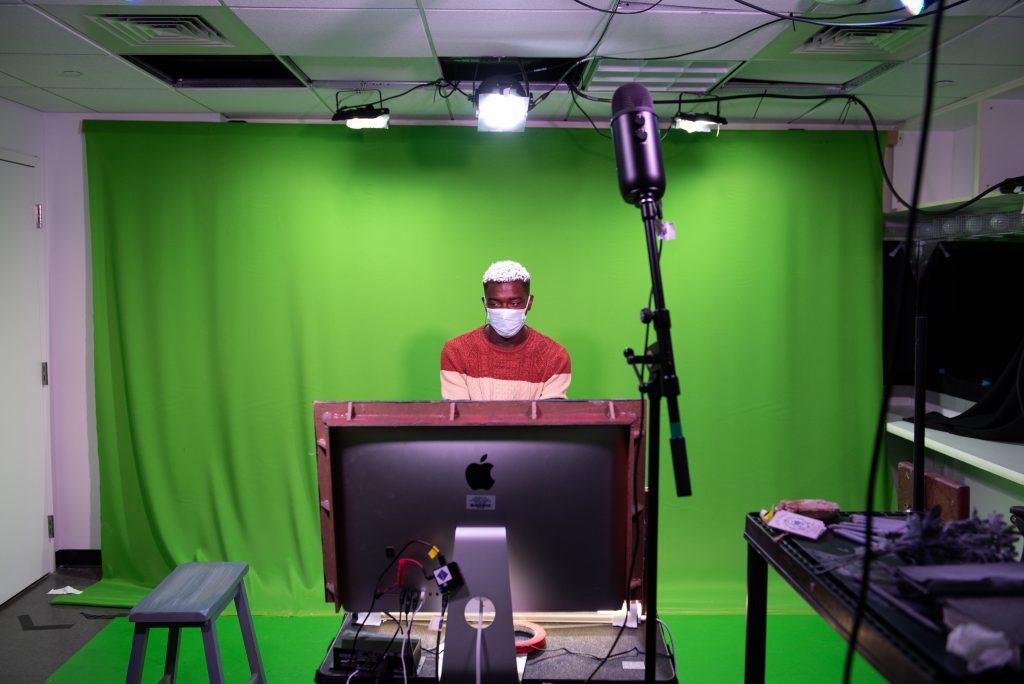Emerson Staff Collaborate on Innovative Partnerships During COVID
When COVID-19 arrived in March 2020, it upended everyone’s way of life, including how we work, teach, and learn at Emerson. Many innovative partnerships were formed among departments in order to create new processes on the fly.
Here are a few examples of these collaborations.
When the pandemic hit, live arts productions came to a halt. But many production companies found ways to reach audiences online.
Emerson Stage was one of those companies. During the 2020–2021 academic year, it produced nine fully realized live virtual theater productions.
With the help of the Performing Arts Department, IT, Media Services, Media Technologies and Production, Facilities, and the Visual and Media Arts Department, Emerson Stage found creative solutions for establishing new stage, sound, and lighting design processes and putting on rehearsals, tech rehearsals, and performances.
Designers created individual props and costumes as usual; however, all of the scenery was digitally produced. Each actor had their own makeshift “studio” scattered around the Tufte PPC. Each studio had cameras, microphones, green screens, computers, props, wardrobe, and lighting. The lighting system was networked all throughout the Tufte — quite an extraordinary feat supported by the IT Office.

Even though the actors were separated, they were able to act together through a screen, thanks to a service called vMix that allowed students and staff to edit the livestream in such a way that the actors appeared to be in the same room, or “stage” as it were.

Staff, faculty, and students involved with Emerson Stage learned a lot about storytelling in a digital world, and this knowledge will be valuable moving forward. Its value goes beyond the new technical education — it also taught everyone to not be afraid of going into the unknown.
*
The health and safety of community members were top priorities during the pandemic. In March 2020, a number of departments collaborated in order to de-densify common spaces on campus. SEAL, the Campus Centers, Business Services, Property Management, Facilities, the Registrar, Academic Affairs, Media Services, IT, the Iwasaki Library, Athletics, and the Office of the Arts were just a few of the departments involved in this process.
Staff from these departments formed a task force that determined and implemented social distancing guidelines and capacities for classrooms, meeting rooms, and event spaces. Each department provided insight on the typical operations and management of the various spaces and support protocols.
Once the space capacities were determined, staff made the necessary adjustments through EMS/Spacebook. Most capacities were reduced to about 25 percent of the original amounts, based on room size and function.
Then, everyone worked to establish a consistent and comprehensive set of policies and practices that would apply to how campus spaces would be utilized. Departments met regularly to assess and revise the protocols due to the ever-changing external COVID guidelines, and to be more efficient in their ability to support community and campus events. A committee composed of space managers was established to review booking requests for non-academic needs and determine which ones could be accommodated safely.
Since the start of the Fall 2021 semester, all meeting and social spaces have returned to full capacity, with some limitations or other guidelines in place. Some academic spaces have retained modified social distance capacities. Additionally, many of the larger spaces on campus, such as the Bordy Theater, continued to host academic classes, while others, such as the Iwasaki Library and the Student Performance Center, were able to return to full function.
The initial task force on space use guidelines has been disbanded, and oversight now falls to either the main COVID task force or the committee of space managers. Campus COVID guidelines require these teams to remain nimble, as there have been instances when limitations on functions or services have had to be reinstated, such as at the start of the Spring 2022 semester.
Categories